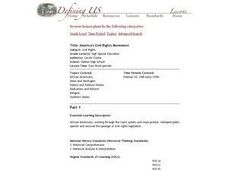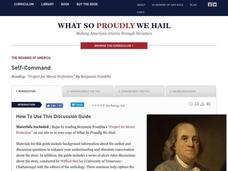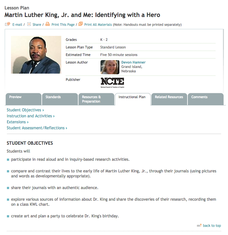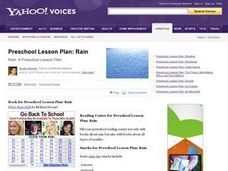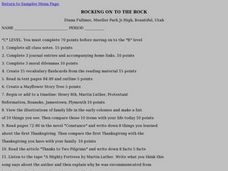Curated OER
Cold War Era Film Censorship: High Noon- a Slice of Americana Or Communist
Students study of the effects of the Cold War on the home front. They analyze the film High Noon according to an abbreviated version of the standards that films were judged by in the early 1950s and determine whether or not High Noon is...
Curated OER
Matthew Henson
Discuss the work of Matthew Henson, an African American who traveled to the North Pole with Robert Peary. After reading the story "Matthew Henson" by Maryann N. Weidt, learners answer questions by drawing inferences and conclusions,...
National Endowment for the Humanities
"An Expression of the American Mind": Understanding the Declaration of Independence
Students research the structure of the Declaration: introduction, main political/philosophical ideas, grievances and assertion of sovereignty. They analyze the ideological/political origins of the ideas in the Declaration. Students...
Curated OER
Jamestown Scavenger Hunt
Students identify and share Primary Sources in Early American History by Janey Levy. Then they discuss the usefulness of using primary sources in uncovering the past. Students also research original documents from Jamestown to complete...
Curated OER
America's Civil Rights Movement
Eleventh graders explore, analyze and study the background to America's Civil Rights Movement through the court system, mass protest, public opinion, political cartoons and legislation. They research Rosa Parks, Brown vs. Board of...
Alabama Department of Archives and History
Alabama's 1901 Constitution: What Was at Stake?
Who should be able to vote? As part of a study of the 1901 Alabama Constitution, class members examine primary source document that reveal the reasons the authors gave to support their positions on this question and their assumptions in...
Roy Rosenzweig Center for History and New Media
Slaves and Indentured Servants
In theory, at least, indentured servitude and slavery were two different practices in the American colonies. Class groups conduct a close reading of two primary source documents, one written by a slave and one by an indentured servant,...
What So Proudly We Hail
The Meaning of America: Freedom and Religion
The United States of America was founded on firm ideals of both the pursuit of happiness and a spirit of reverence. Through a close reading of Nathaniel Hawthorne's "The May-Pole of Merry Mount," you can examine what some consider was a...
What So Proudly We Hail
The Meaning of America: Equality
What if society sought equality by handicapping the gifted and dispelling any traces of diversity? Kurt Vonnegut Jr. offers one possible answer to this question through his incredibly engaging and thought-provoking satirical...
What So Proudly We Hail
The Meaning of America: National Identity and Why It Matters
Combining a close reading of a classic American text with the study of history can be a very powerful strategy, and this is most certainly the case with this resource using Edward Everett Hale's The Man without a Country. Consider themes...
What So Proudly We Hail
The Meaning of America: Self-Command
Even for one of the most accomplished men in American history, there was room for improvement. Challenge high schoolers to use Benjamin Franklin's Project for Moral Perfection to analyze text, make inferences, connect to historical...
Curated OER
Analyzing the Use of Irony in a Short Story
Ninth graders examine how literature connects to real-life and see how irony aids in the development of theme. They read Shirley Jackson's The Lottery, and discuss elements of foreshadowing and situational irony. Then learners will write...
Japan Society
Akutagawa Ryunosuke and the Taisho Modernists
Japan's Taisho Period was a time when authors like Akutagawa and other Japanese modernists began to experiment with point of view and literary form, making the literature produced during this time period a natural choice for teaching...
ReadWriteThink
Martin Luther King, Jr. and Me: Identifying with a Hero
Here, young historians compare their early lives to that of Dr. Martin Luther King Jr.'s. They listen to a read aloud of a story by Dr. King's sister, and then write in the provided reflective journal template. Lastly, they share their...
Curated OER
Remember the Bridge: Poems of a People
Fifth graders explore poems of African Americans. They research a famous African American, write a report, create a timeline of events in African American history, create a map of the New World, and research Molly Walsh. After...
Curated OER
POWWOW
Students investigate the significance of the Powwow to the Native Americans. They write a story about a special tradition or custom from their own family, play Native American children's games, prepare Indian fry bread, and participate...
Curated OER
Rain
Students are introduced to the Native American game called "Rain" and develop cooperative learning skills. In this Native American game instructional activity, students sit in a circle and discuss how games reflect the environment the...
Curated OER
ROCKING ON TO THE ROCK
Students view the illustrations of family life in the early colonies and make a list of 10 things they see. Then compare those 10 items with your life today. Then read some of the novel "Constance" and write down 8 things that are learned.
Curated OER
Pilgrims: The First Americans
Fifth graders become familar with the pilgrims and first Thanksgiving through essays about important people of the time. In this Thanksgiving lesson, 5th graders choose an important figure from the time of the Pilgrims and write a two...
Curated OER
American Born Chinese
Students make thematic connections and organize their ideas using a Venn Diagram. In this Venn Diagram instructional activity, students compare 3 different stories from a novel and fill in a Venn Diagram. Students then discuss their...
Curated OER
American Foreign Policy Since World War II (The Cold War)
Students identify and interpret some key figures and major events during the Cold War era, including the Korean War, Vietnam, Cuban Missile Crisis, Bay of Pigs Invasion, and the United States and China Cold War Relations. They also play...
Curated OER
Gathering and Evaluating Sources for the "Greatest American" Speech
Students brainstorm a list of criteria for determining credible sources for their research. They research information to include in their "Greatest American" speech. Students will evaluate all sources by applying the criteria they agreed...
Curated OER
An Early Threat of Secession: The Missouri Compromise of 1820 and the Nullification Crisis
Students analyze an interactive map of the Missouri Compromise to identify the regions and their relation to slavery. In this pre-civil war era instructional activity, students read primary source documents and research online to answer...
Curated OER
Poet James Whitcomb Riley: Famous in His Own Day
An engaging biography of "Hoosier" poet James Whitcomb Riley serves as a springboard for study of his unique dialect-based verse. Several activities illuminate differences between spoken vernacular and formal language. Learners record...






